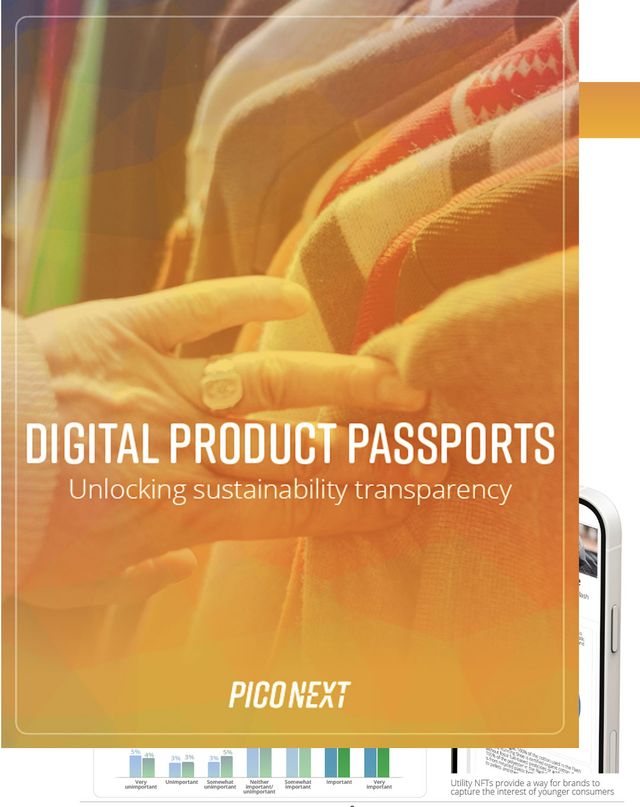Fully 91 percent of consumers believe that at least some brands engage in “greenwashing” – portraying a false impression of environmental marketing claims – according to new global survey research that we released today. But even with this skepticism, 71 percent of consumers say that sustainability is important to them when making a purchase decision. Transparency can bridge the gap between brands’ sustainability claims and consumer trust, with 67 percent of consumers saying they’d be more likely to purchase a product with more sustainability information.
These findings, along with many others, are highlighted in our new report Digital Product Passports: Unlocking Sustainability Transparency, which studied consumers’ attitudes towards sustainability transparency.
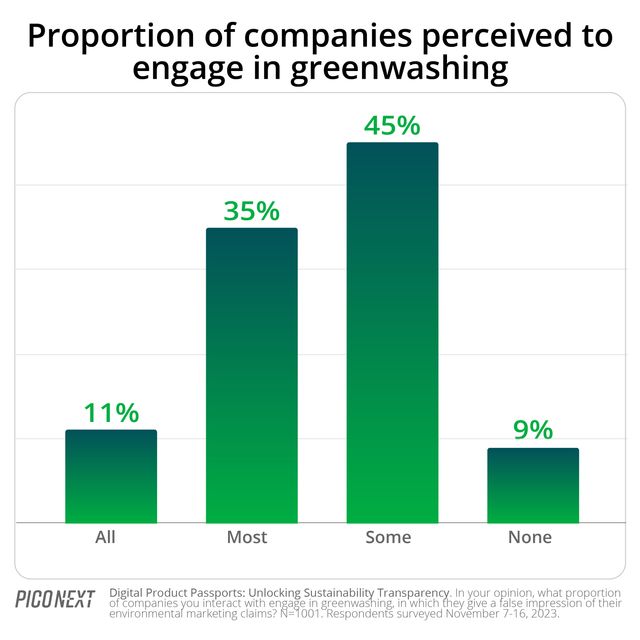
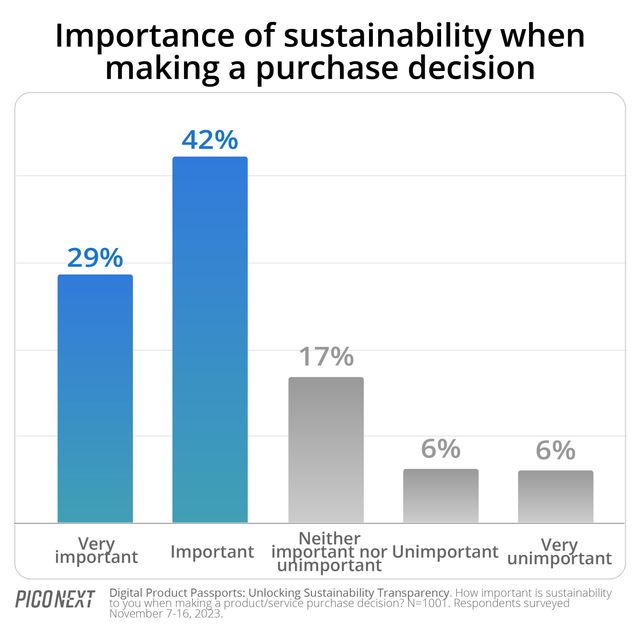
In our research, we surveyed 1001 consumers in the United States and Europe to find out their behaviours and thoughts about sustainability – including attitudes around environmental-based claims, what transparency information customers expect from companies, and the opportunity brands have to connect more deeply with users using sustainability.
Companies produce sustainability reports, but obstacles exist
When consumers turn to company-produced sustainability reports for more clarity on a brand’s environmental actions, some obstacles prevent them from fully engaging with them. The reasons for not engaging more deeply with sustainability reports include that they are too complex to understand (40.3%), too long (38.4%), and hard to find (36.3%). However, consumers indicate that they would like to access sustainability reporting more easily by scanning a QR code associated with a product, with 55% agreeing that this is their preferred access option.
Digital Product Passports improve consumer trust and purchase intent
Increased access to transparent sustainability data attracts consumers to a brand when they are making purchasing decisions. In fact, viewing product-level sustainability information through a Digital Product Passport – an emerging format for distributing transparency data pioneered by the European Union – improves consumer trust in a brand and purchase intent for its products.
73% of consumers indicate that access to detailed sustainability information helps them have more trust in a brand, with 67% also saying that they would be more likely to purchase a product with this increased information.
These findings signal to brands that they should start preparing for Digital Product Passport implementation in advance of EU regulatory requirements – not only because it makes business sense, but because it’s the right thing to do.
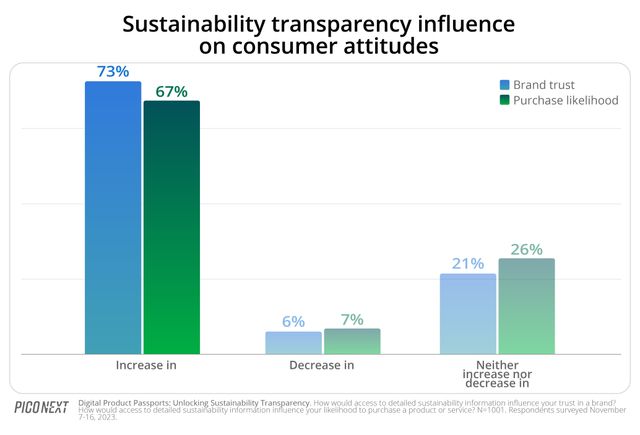
Top expectations for transparency: Recyclability and materials composition
In terms of the data attributes that consumers would like to view in a Digital Product Passport, information about a product’s recyclability rises to the top, with 56.1 percent saying knowing more about it would increase their purchase intent. Other top sustainability attributes consumers would like to see include information about type of materials used (44.4%), anti-child labour statements (39.6%), and waste reduction efforts (39.0%).
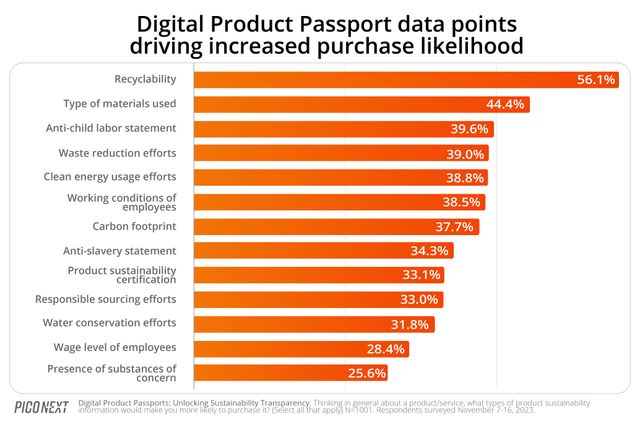
See all data and infographics in the full report
Consumers want transparency in order to recycle and ensure safe usage
According to our research, customers are pressing brands to disclose more information about their sustainability efforts for a variety of reasons, with the top reason being they want access to be able to verify the authenticity of a product (34.7%). In addition to this, they want the ability to verify a brand’s sustainability claims (33.7%), and the ability to locate recycling services (33.7%).
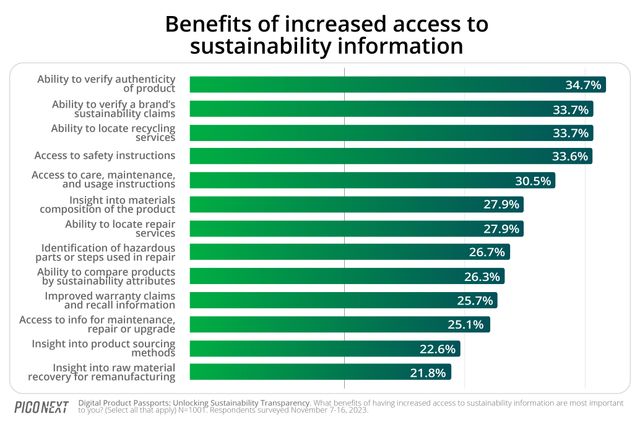
Transforming insight into actionable sustainability strategies
We’ve compiled these statistics into our new report, "Digital Product Passports: Unlocking Sustainability Transparency" (/landing/digital-product-passport-sustainability), along with strategies that brands can use in their sustainability strategies to take advantage. In addition to the data outlined above, our survey research covers:
- Customers’ desire to trace a product throughout its lifecycle,
- The impact of third-party certifications on sustainability programmes.
- Top expectations for transparency data points
In the full report, you’ll find suggestions on how to use these insights for your business, including:
- Strategies that fashion, manufacturing, and other companies can use to drive transparency
- How to develop a Digital Product Passport strategy to comply with global regulations
- Original data and 10+ infographics from our original sustainability transparency survey research
- And more ideas and strategies to use sustainability to engage customers
Download the full report to start accelerating your strategies with sustainability transparency today.

